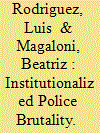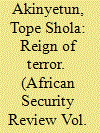|
|
|
Sort Order |
|
|
|
Items / Page
|
|
|
|
|
|
|
| Srl | Item |
| 1 |
ID:
193045


|
|
|
|
|
| Summary/Abstract |
On 20 October 2020, the military and police force opened fatal shootings at peaceful unarmed #EndSARS protesters. This article examines the political and socio-economic undercurrents of #EndSARS protest. It argues that the predatory state–society relations where the state is the predator and citizens are the preys nurtured the increasing distrust between the state and its citizens, and ultimately, resulted in the deepening mutual mistrust between the police and people. The article concludes that the #EndSARS protest created opportunity for the Nigerian state to accelerate and accumulate its bourgeoning repressive character instead of reducing it. It recommends symbiotic state–society relations.
|
|
|
|
|
|
|
|
|
|
|
|
|
|
|
|
| 2 |
ID:
175276


|
|
|
|
|
| Summary/Abstract |
How can societies restrain their coercive institutions and transition to a more humane criminal justice system? We argue that two main factors explain why torture can persist as a generalized practice even in democratic societies: weak procedural protections and the militarization of policing, which introduces strategies, equipment, and mentality that treats criminal suspects as though they were enemies in wartime. Using a large survey of the Mexican prison population and leveraging the date and place of arrest, this paper provides causal evidence about how these two explanatory variables shape police brutality. Our paper offers a grim picture of the survival of authoritarian policing practices in democracies. It also provides novel evidence of the extent to which the abolition of inquisitorial criminal justice institutions—a remnant of colonial legacies and a common trend in the region—has worked to restrain police brutality.
|
|
|
|
|
|
|
|
|
|
|
|
|
|
|
|
| 3 |
ID:
139491


|
|
|
|
|
| Summary/Abstract |
This article assesses South Africa's 20 years of democracy, which has frequently been bedevilled by local protests. This article is particularly interested in those unrest incidents that have been distinct for one reason or another. In South Africa, the surge in local unrest incidents is often linked to police behaviour, which has become increasingly militant and brutal when quelling protests. While the right to protest is constitutional, the damage caused during protest action can be immense owing to acts of violence. Protestors' resorting to violent protest action is often linked to increased frustrations as a result of the government's inability to live up to the expectations of marginalised and poor communities. While this article draws primarily on existing scholarly debates focusing on social protests, the primary objective is to examine the impact of unrest incidents on local protests in post-apartheid South Africa. The article further argues that ‘spaces’ for participation in local governance should be created so that citizens can become architects of development and their own future.
|
|
|
|
|
|
|
|
|
|
|
|
|
|
|
|
| 4 |
ID:
177034


|
|
|
|
|
| Summary/Abstract |
This article reflects on community-based participation to reduce violent crimes in South Africa. Despite many policing strategies being developed and implemented over the years to reduce violent crimes in South Africa, these crimes are still on the increase. Against this background, the researcher reflects on some of the perceptions of violent crimes and policing that erode public confidence daily. The study is essentially qualitative in its approach. The researcher used the snowball sampling technique to identify community members from the Tshwane metropolitan area in Gauteng for in-depth interviews. The findings revealed that community members were unhappy with the level of community participation in the day-to-day policing of violent crimes in communities. This alienated them from the police and had an adverse effect on the ability of the police to enforce safety and security in communities. In view of these findings, there is a need for the police to enhance community participation so that the needs and expectations of communities are given priority.
|
|
|
|
|
|
|
|
|
|
|
|
|
|
|
|
| 5 |
ID:
182435


|
|
|
|
|
| Summary/Abstract |
Few days after Nigeria attained the sexagenarian status on October 1, 2020, the country has once again become a subject of unusual discourse both home and abroad. This is due to the protests by disgruntled youths against the activities of the Special Anti-Robbery Squad; a unit of the Nigeria Police Force, which has been accused of brutality, human rights violation, sexual abuse, torture, and extrajudicial killings among others. This study adopts a qualitative approach which draws data from reports of reputable international organisations, juried scholarly articles, working papers, and newspaper articles. The study concludes that the police adopts brutality, abuse, and violations as its tactics due to its inadequate equipment for investigation which makes officers deploy torture as a means of extracting the truth. This is further complicated by an ingrained culture of corruption, inadequate funding, political interference, inadequate personnel, and a pro-elite orientation. As a result, it is recommended that a sincere and comprehensive reform of the police be carried out to improve the welfare of the police; encourage the use of extensive technology, and improve police-community relations.
|
|
|
|
|
|
|
|
|
|
|
|
|
|
|
|
|
|
|
|
|